Serving 520 students in grades Prekindergarten-5, Stratham Memorial School ranks in the top 30% of all schools in New Hampshire for overall test scores (math proficiency is top 50%, and reading proficiency is top 50%).
The percentage of students achieving proficiency in math is 50% (which is higher than the New Hampshire state average of 40%). The percentage of students achieving proficiency in reading/language arts is 67% (which is higher than the New Hampshire state average of 51%).
The student:teacher ratio of 11:1 is equal to the New Hampshire state level of 11:1.
Minority enrollment is 8% of the student body (majority Asian), which is lower than the New Hampshire state average of 18% (majority Hispanic).
Quick Stats (2025)
- Grades: Prekindergarten-5
- Enrollment: 520 students
- Student:Teacher Ratio: 11:1
- Minority Enrollment: 8%
- Overall Testing Rank: Top 30% in NH
- Math Proficiency: 50% (Top 50%)
- Reading Proficiency: 67% (Top 20%)
- Science Proficiency: 45-49% (Top 50%)
- Source: National Center for Education Statistics (NCES), NH Dept. of Education
Top Rankings
Stratham Memorial School ranks among the top 20% of public schools in New Hampshire for:
Category
Attribute
Reading/Language Arts Proficiency
School Overview
Stratham Memorial School's student population of 520 students has declined by 6% over five school years.
The teacher population of 46 teachers has grown by 12% over five school years.
Grades Offered
Grades Prekindergarten-5
Total Students
520 students
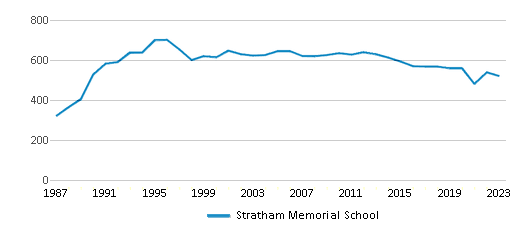
Gender %
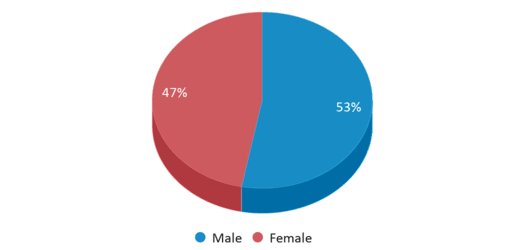
Total Classroom Teachers
46 teachers
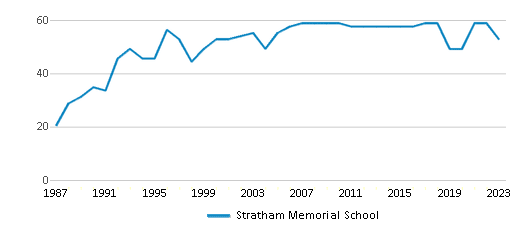
Students by Grade
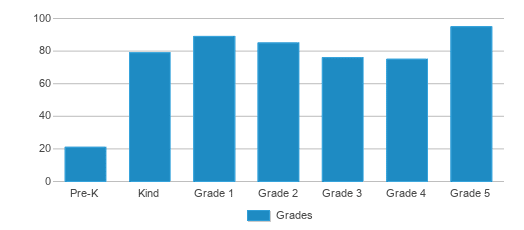
School Rankings
Stratham Memorial School ranks within the top 30% of all 457 schools in New Hampshire (based off of combined math and reading proficiency testing data).
The diversity score of Stratham Memorial School is 0.15, which is less than the diversity score at state average of 0.32. The school's diversity has stayed relatively flat over five school years.
Overall Testing Rank
#98 out of 457 schools
(Top 30%)
(Top 30%)
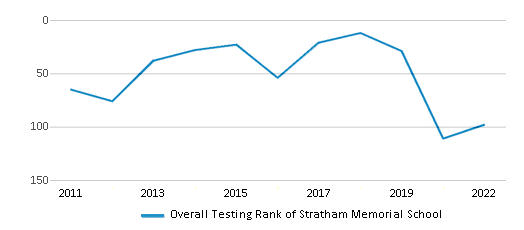
Math Test Scores (% Proficient)
50%
40%
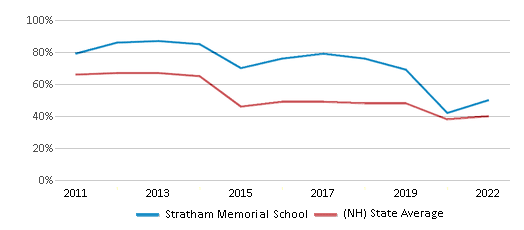
Reading/Language Arts Test Scores (% Proficient)
67%
51%
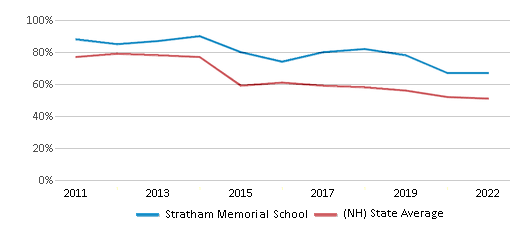
Science Test Scores (% Proficient)
45-49%
36%
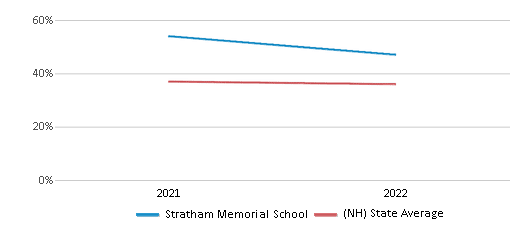
Student : Teacher Ratio
11:1
11:1
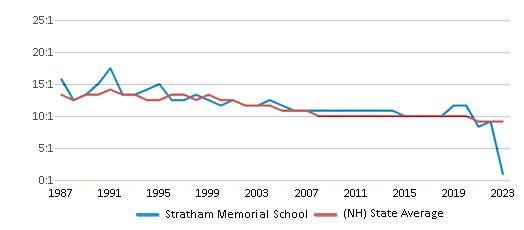
American Indian
n/a
n/a
Asian
3%
3%
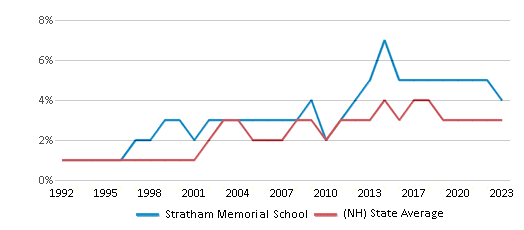
Hispanic
2%
8%
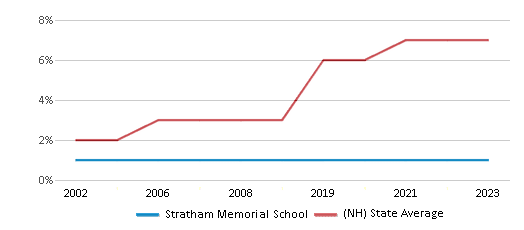
Black
n/a
2%
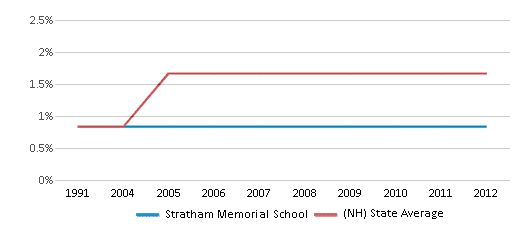
White
92%
82%
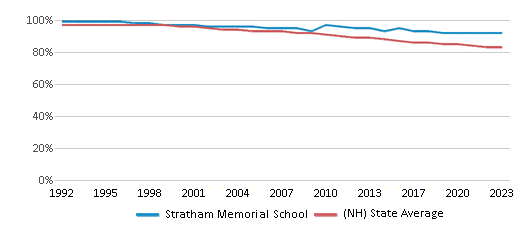
Hawaiian
n/a
n/a
Two or more races
3%
5%
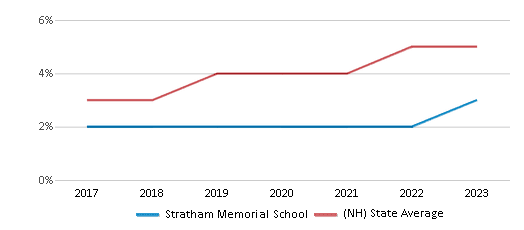
All Ethnic Groups
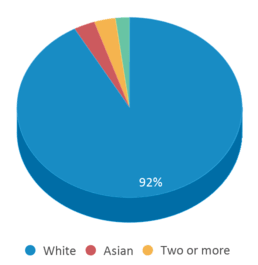
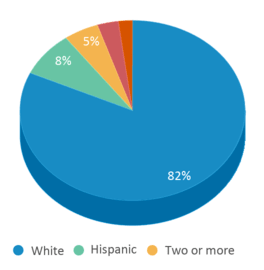
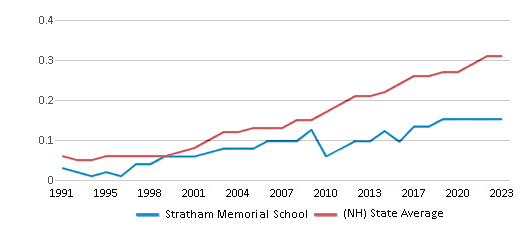
Participates in the National School Lunch Program (NSLP)
Yes
Eligible for Free Lunch
6%
20%
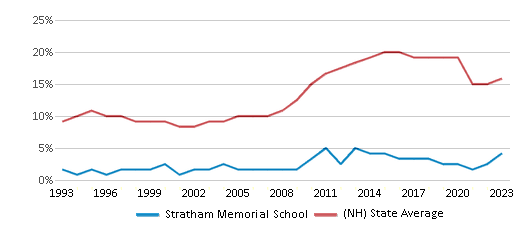
Eligible for Reduced Lunch (17-18)
1%
4%
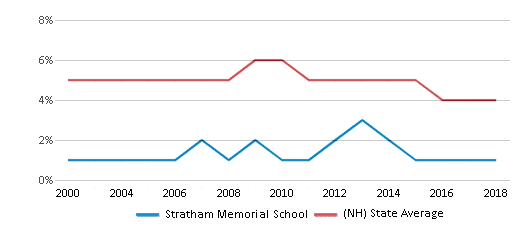
School District Name
Source: National Center for Education Statistics (NCES), NH Dept. of Education
Profile last updated: 02/09/2025
Frequently Asked Questions
What is Stratham Memorial School's ranking?
Stratham Memorial School is ranked #98 out of 457 schools, which ranks it among the top 30% of public schools in New Hampshire.
What schools are Stratham Memorial School often compared to?
Stratham Memorial Schoolis often viewed alongside schools like Greenland Central School by visitors of our site.
What percent of students have achieved state testing proficiency in math and reading?
50% of students have achieved math proficiency (compared to the 40% NH state average), while 67% of students have achieved reading proficiency (compared to the 51% NH state average).
How many students attend Stratham Memorial School?
520 students attend Stratham Memorial School.
What is the racial composition of the student body?
92% of Stratham Memorial School students are White, 3% of students are Asian, 3% of students are Two or more races, and 2% of students are Hispanic.
What is the student:teacher ratio of Stratham Memorial School?
Stratham Memorial School has a student ration of 11:1, which is equal to the New Hampshire state average of 11:1.
What grades does Stratham Memorial School offer ?
Stratham Memorial School offers enrollment in grades Prekindergarten-5
What school district is Stratham Memorial School part of?
Stratham Memorial School is part of Stratham School District.
School Reviews
5 10/9/2020
SMS (Stratham Memorial School) is great. I graduated a year ago and I will never forget that school. They taught me so much, and every teacher there is kind and caring. Each day we would alternate between Music, Physical Education, Maker Space, and Art. If there were a student, that's behind on the class, the teachers would adapt to teach them the way they should be taught. I met so many friends on my journey, and I'm glad to have once been a part of this community.
2 2/10/2020
We moved here for the great schools. If you like an elementary school that does not adequately handle bullying, that does not provide assistants in its classrooms, that dilutes its content and teaches to the lowest performing student in the class, then this is your school. The 12:1 student ratio that is claimed above is completely wrong. Class sizes have grown and teachers on their own with up to 18 kids in the younger grades. This takes away from the learning experience.
Review Stratham Memorial School. Reviews should be a few sentences in length. Please include any comments on:
- Quality of academic programs, teachers, and facilities
- Availability of music, art, sports and other extracurricular activities
Recent Articles

What Is A Charter School?
Explore the world of charter schools in this comprehensive guide. Learn about their history, how they operate, and the pros and cons of this educational innovation. Discover key facts about charter schools, including admission policies, demographics, and funding, as well as what to look for when considering a charter school for your child.

10 Reasons Why High School Sports Benefit Students
Discover the 10 compelling reasons why high school sports are beneficial for students. This comprehensive article explores how athletics enhance academic performance, foster personal growth, and develop crucial life skills. From improved fitness and time management to leadership development and community representation, learn why participating in high school sports can be a game-changer for students' overall success and well-being.

February 05, 2025
Understanding the U.S. Department of Education: Structure, Impact, and EvolutionWe explore how the Department of Education shapes American education, from its cabinet-level leadership to its impact on millions of students, written for general audiences seeking clarity on this vital institution.


![Stratham Memorial School Board Meeting [ June 2020 ]](https://i.ytimg.com/vi/yY1X76Ntork/0.jpg)






